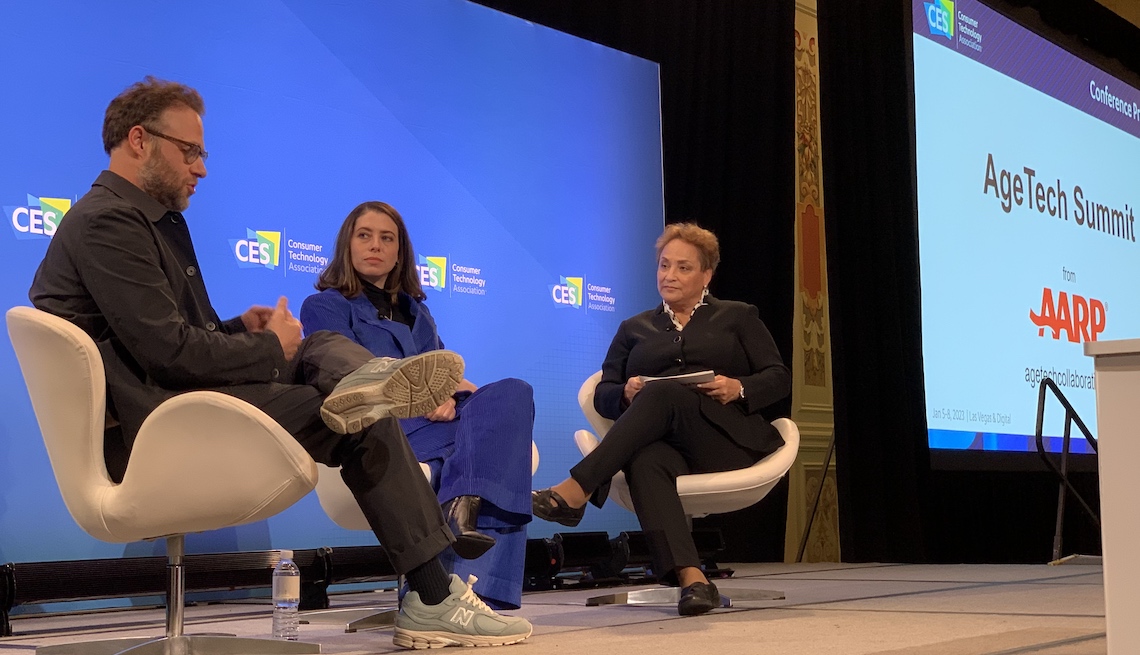
- Select a language for the TTS:
- UK English Female
- UK English Male
- US English Female
- US English Male
- Australian Female
- Australian Male
- Language selected: (auto detect) - EN
Play all audios:
She and her husband may have comedic backgrounds. But she said the movie will not be sugarcoated or come off as sitcomish. “We want to make something that people can watch, they can learn,
they can relate to and feel inspired by,” she said. Keach’s Glen Campbell documentary followed the late singer’s final concert tour after he, too, had been diagnosed with Alzheimer’s. It
also had a lighter side. “I’d say, ‘Glen, how’s the Alzheimer’s? He’d say, ‘I don’t have Alzheimer’s I have part-timers,’” Keach said in an off-stage interview. “Then I’d ask tough questions
like, ‘What did you forget today?’ He’d say, ‘Hell, I don’t know. You tell me.’ It’s creating the levity. We all have to laugh, even people with Alzheimer’s.” OVERALL HEALTH CAN KEEP
DEMENTIA AT BAY In AARP's AgeTech Collaborative booth at CES, formerly known as the Consumer Electronics Show, officials at RAZ Mobility explain their more simple smartphone for
dementia patients to AARP CEO Jo Ann Jenkins, center; Andy Miller, senior vice president of AARP's Innovation Labs; and actor-comedians Lauren Miller Rogen and Seth Rogen. Linda Dono,
AARP In their own work to bring awareness to dementia prevention, the Rogens are preaching the importance of getting enough sleep and other habits that support brain health, which are
important ways to lower your dementia risk, according to the federal Centers for Disease Control and Prevention. “The average person knows how to take care of their hearts: Don’t eat too
much fat,” Rogen said. “If you smoke, it’s bad for your lungs. If you exercise, it’s good for your muscles and your body. But almost no one knows what to do for their brain.” He lamented
that most young doctors he comes across haven’t been inspired to join the fight against dementia or Alzheimer’s because the field is grossly “underfunded in comparison to a lot of other more
glamorous diseases.” AARP is doing its part to change that. “One of the things I say when I’m up on the Hill advocating is every member of Congress has a caregiving story,” Jenkins said.
“This whole issue about brain health is something that our 38 million members tell us is the one thing they fear most in life, losing their cognizance and having brain health issues.” AARP
has invested more than $100 million in the Dementia Discovery Fund. The venture capital fund in the United Kingdom provides money to biotech companies seeking to discover therapies and cures
to stop or slow the onset of dementia. AARP also teamed up with the Alzheimer’s Society, Challenge Works and other organizations to launch the Longitude Prize. This international
competition pushes the world’s innovators to use artificial intelligence and machine learning to develop assistive technologies that will improve the quality of life for people with dementia
and their caregivers.




:max_bytes(150000):strip_icc():focal(839x38:841x40)/felix-silla-4-0125b854d34642bdab1977b715e81587.jpg)

